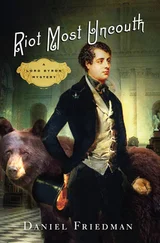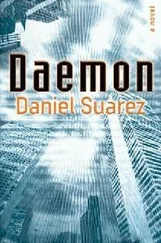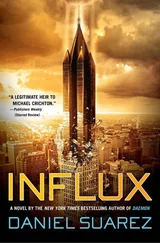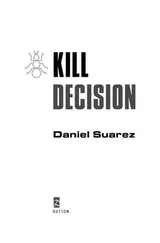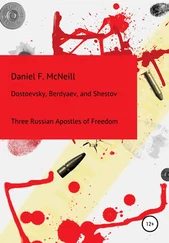“This is just the first wave, I think. A lot more people are about to fall out of the old economy.”
“You think so?” Fossen brought the truck slowly through the crowd, people making way. He nodded to them genially. “I mean, how could we let this happen here in America?”
“It’s no accident. I’ve seen it before in other countries. It’s all about control. The powerful scaring people into submission.”
Fossen nodded. “I’ve had some experience with that. Just not on this scale.”
“This is nothing. The real shock is coming. Believe me.”
Fossen gestured to the tent city out the window. “ This isn’t the real shock?”
“No. It’ll be much, much worse. They’ll try to psychologically traumatize the public into accepting a new social order.”
“And you know this because . . . ?”
“Firsthand experience.”
Fossen raised his eyebrows. “I can tell you’re going to be a barrel of fun on the way.”
After a few minutes Fossen finally brought them out of the crowd. As the old Ford picked up speed, the cab got much noisier, especially with the windows open, and they drove for a while without talking.
Eventually Fossen turned to his passenger, shouting, “So what brings a rogue to Greeley?”
“I’m looking for someone.”
“They in trouble?”
Ross shook his head. “No. I got word a few days ago that an old friend I thought was dead is actually alive.”
“That’s good news. Does he know you’re coming?”
“He moves around. He’s hard to get in touch with.”
“Maybe I’ve heard of him. What’s his name?”
“The Unnamed One.”
“That’s his name ? ‘Unnamed One’?”
“You might know him better by his real name: Detective Pete Sebeck.”
Fossen just frowned. “The Daemon hoax guy? He’s not really dead?”
“You didn’t see the news feeds on his quest?”
“I don’t read news feeds much. Not enough time in the day lately. How do you know he’s in Greeley?”
“I’ve seen feed reports that say he’s in the area.”
“That’s new to me, but like I said, I don’t read the feeds much.” Fossen seemed to be pondering something. “I’m no expert, but can’t you just search for his coordinates if you know his handle?”
“He keeps them unlisted—I suspect because of all the press he’s been getting. A lot of people are following his quest.”
“So he’s on a quest —as in, heroic journey and all that?”
“They say he’s searching for something called the Cloud Gate. A portal that may unlock a higher level of the darknet.”
“Well, best of luck to him.”
“Apparently he’s also been appearing in places where paramilitary units have been operating—helping to develop a smart mob-alert system.”
“Well, we haven’t had any of that stuff occur near us. It’s been in Nebraska and Kansas mostly.”
Ross looked at the landscape and rows of abandoned houses with FOR SALE signs in suburban subdivisions. “They’re still foreclosing on houses out here?”
“No. I think people are just abandoning them. Off to find work or public relief facilities. Driving is no longer an option for most people, and there’s nothing to live on out here.”
“Is anyone swallowing the ‘illegals gone wild’ story?”
“I don’t know. I think people would have noticed armed gangs if they really existed.”
“Oh, they exist. They’re just not what the media claims.”
“Then what are they?”
“Paramilitary units. Terror squads.”
Fossen just gave him a look. “I think we would have noticed that, too.”
“Not if they move at night by helicopter.”
“Helicopter?”
Ross nodded. “They fly in low and fast. Drop in teams, advance on foot, then ex-fil by chopper. They’ve hung people. Burned houses. On television the next day you usually hear how gang violence is behind it. Senators calling for martial law. And checkpoints.”
“How do you know all this?”
“I’ve been tracking their movements for the last several months.”
Fossen just gave Ross a sideways look. “Are you pulling my leg?”
Ross pointed to Fossen’s call-out. “You joined the darknet recently.”
“Yeah. My daughter convinced me. She’s really something.”
“You have a farm?”
“Fifth generation—a ‘horticulturalist’ now, I guess. My daughter has made a lot of positive changes to our operation. You should come by and see it.”
“I’d like that.”
“Jenna’s rising fast in the Greeley holon. She’s leading two projects now—a biodiversity initiative and an education program.”
“You must be proud.”
“I’m proud of both my kids. Life is starting to make sense again for us. I just hope we can get other folks on the new economy in time.”
Fossen turned the old truck onto a county road and soon they were heading out into a veritable ocean of green corn plants stretching unbroken to the horizon. This road was even louder in the old truck, so Ross just watched the landscape roll by.
They occasionally passed through small, downscale towns. Ross was able to spot them at a distance not by their church steeples but by the local grain elevators—invariably a row of concrete tubes a hundred to a hundred and fifty feet tall looming like missile silos at the end of Main Street.
Between the towns they passed several abandoned farmhouses, crumbling in the prairie. The clapboard ruins were choked with bushes and collapsing in on themselves.
Ross shouted over the engine. “That doesn’t look recent. Why all the empty houses?”
Fossen leaned close. “Been happening for decades. Farms had to get big or go out of business. Market forces. The population of this county has dropped about a third in the last fifteen years or so. It’s coming back now, though.”
He slowed the truck down, and they turned this time onto a gravel road that was ramrod straight. They were traveling slower now, and it was much easier to talk.
“The fields look healthy.”
Fossen waved him off. “Those plants have as much to do with agriculture as a weight lifter on steroids has to do with physical fitness. See that?” He pointed out tiny plastic signs spaced ten yards apart running along the edges of the fields near the road. The signs stretched into the distance and all bore the image of a green leaf with a single dewdrop dripping from the tip. The text HALPERIN ORGANIX—MITROVEN 336 was written in a bold sans serif font beneath the logo. The signs looked cheerful, healthy, and inviting. “They’re all clones designed to maximize kernel production. In fact, ninety-eight percent of the crops grown in this country a century ago are now extinct.
“This is just a big green desert. You’d starve to death out here. This corn is inedible—it’s just starch; it needs to be processed in an industrial stomach, with acids and chemicals, to break it down into processed food additives. We’re up to our eyeballs in corn here in Iowa and we can’t even feed ourselves.”
“I gather that’s the plan.”
Fossen nodded. “Damned right. Big business was screwing over farmers in the 1890s, too, and my grandfather’s father didn’t put up with it back then, either. There was an uprising. You might not think it, but it was always the farmers who raised hell in this country. They worked for themselves, were self-reliant, and weren’t about to take shit from anybody. But then some clever bastard figured out how to make crops inedible. My family’s been doing industrial farming for forty years and all it produces is debt, pollution, and water shortages. It ruins the land and the people on it.”
Ross nodded to the uniform fields out the window. “You think these other farmers will change?”
Читать дальше

